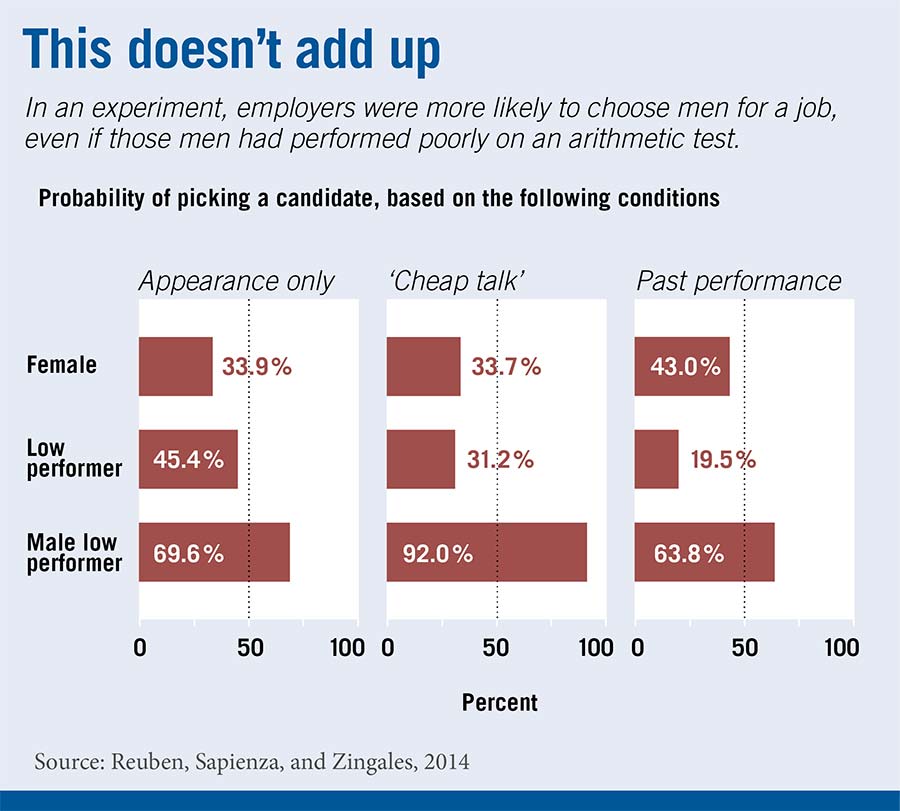
Research suggests that both male and female employers are more reluctant to hire women for math-related positions.
- By
- June 27, 2014
- CBR - Summer 2014

Research suggests that both male and female employers are more reluctant to hire women for math-related positions.
Larry Summers caused waves when, as president of Harvard, he made a 2005 speech about why men still significantly outnumber women in STEM (science, technology, engineering, and math) careers. Summers controversially suggested that innate differences between men and women might explain the trend, but also posited that the gender disparity could be cause by different career preferences or discrimination.
Research by Chicago Booth Professor Luigi Zingales suggests that discrimination may indeed be a culprit, since both male and female employers are more reluctant to hire women for math-related positions.
Zingales, along with Ernesto Reuben of Columbia Business School and Paola Sapienza of the Kellogg School of Management at Northwestern University, designed a series of laboratory experiments to measure how potential employers respond to female applicants when hiring for a job that involves arithmetic.
In each experiment, researchers asked 45 male and female subjects to add up as many sets of four two-digit numbers as possible in four minutes. This task was specifically chosen because there is strong evidence that men and women perform it equally well. Subsequently, the researchers designated two subjects from the group, one male and one female, as potential job candidates. They made the rest potential employers, who conducted face-to-face interviews with the two candidates.

Candidates were informed they would earn more money from the experiment if hired, while employers were told they would earn more if they correctly selected the more-qualified candidate, based on the results of the arithmetic test.
Under one condition of the experiment, potential employers were in the same room as the candidates and simply observed them. Zingales and his collaborators found that male and female employers were twice as likely to hire a man than a woman when the only factor they observed was physical appearance.
In another condition, candidates had the opportunity to tell potential employers how well they expected to do on a second, upcoming arithmetic test. The researchers considered this "cheap talk," as candidates could boast about skills they didn't have. Male candidates tended to inflate their abilities, while the female candidates tended to underestimate their abilities. The researchers found bias against women remained.
The findings suggest that discrimination is an integral reason for the low numbers of women in STEM careers. If the evidence holds outside the lab as well, it implies that real-world employers may often be choosing less-qualified male candidates over more-qualified female ones, and women may be losing their chances to pursue STEM careers because of hiring biases.
According to the study, hiring less-qualified candidates is strongly associated with gender bias. If hiring decisions were gender neutral, the fraction of times that a lower-performing man was hired over a higher-performing woman would be 50%. But the experiments showed that bad decisions in favor of a male candidate occurred 14% more often than bad decisions in favor of a female candidate, regardless of the scenario. Hiring less-qualified candidates leads to costly consequences for the companies involved, the researchers say.
But the cost to women is even greater. In the condition in which potential employers knew only the gender of the candidate, the expected earnings of the female candidates were 19.4% less than those of their male counterparts.
Perhaps the researchers' most important finding is that both men and women discriminate against women without realizing they are doing so. All participants took a computer-based implicit association test in which they rapidly placed into categories words and pictures they observed on the screen. The speed with which the test was completed, often less than a second for a pairing, revealed participants' implicit, often subconscious thoughts.
According to the researchers, the findings suggest that new antidiscrimination policies need to be designed and implemented to change what turns out to be unconscious behavior.
Ernesto Reuben, Paola Sapienza, and Luigi Zingales, "How Stereotypes Impair Women's Careers in Science," Proceedings of the National Academy of Sciences, January 2014.

Research finds evidence for an active market for CEOs among PE-owned companies in the US.
PE Investors Hire Outsiders as CEOs
John Paul Rollert talks with New York Times reporter Mike Isaac about the details of Uber’s culture and rapid success.
The Book Report: Mike Isaac’s “Super Pumped: The Battle for Uber”
How should you respond to a colleague’s careless remark?
Business Practice: Witnessing a MicroaggressionYour Privacy
We want to demonstrate our commitment to your privacy. Please review Chicago Booth's privacy notice, which provides information explaining how and why we collect particular information when you visit our website.